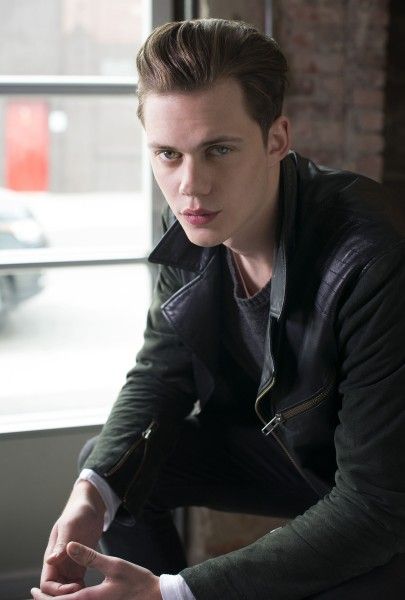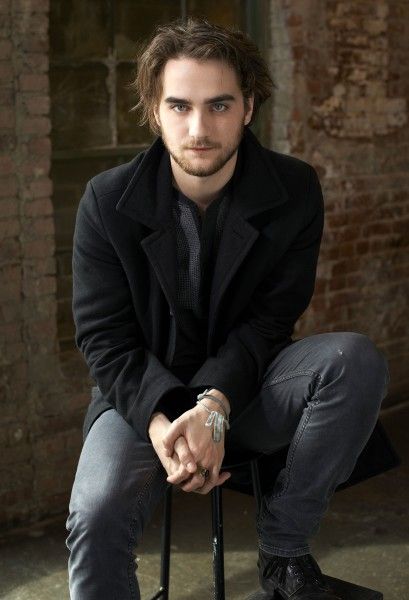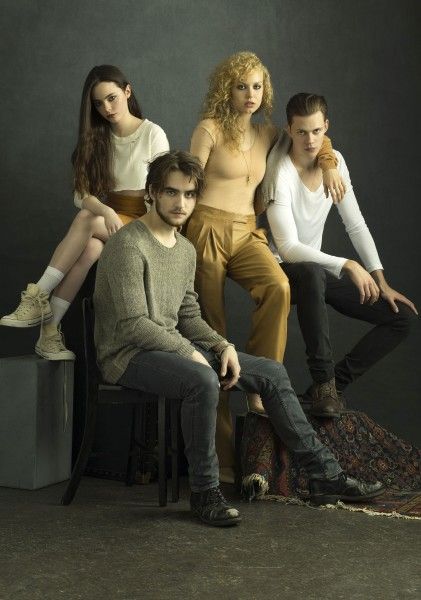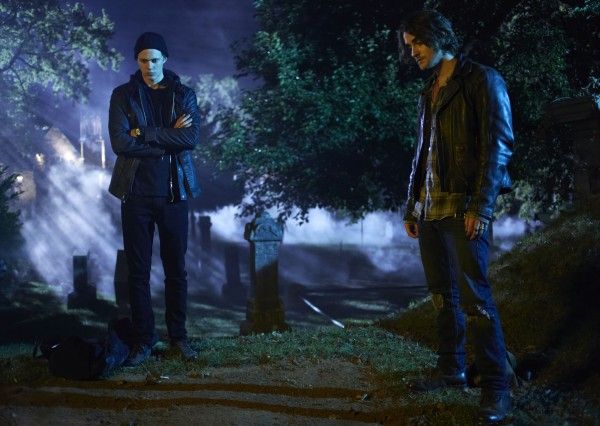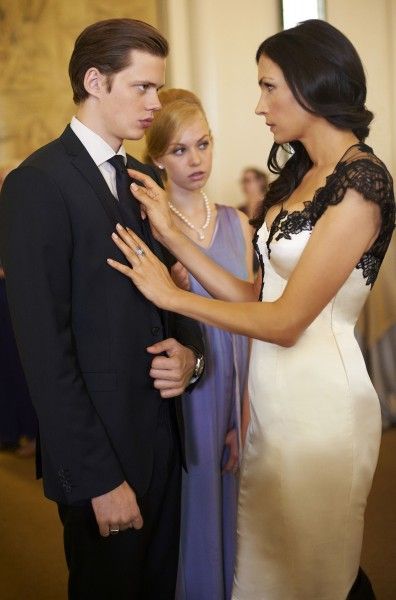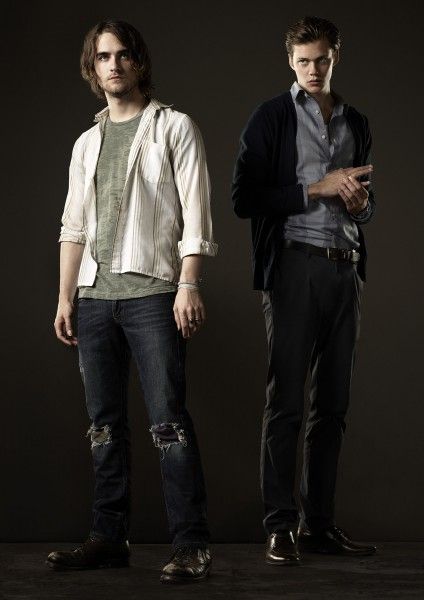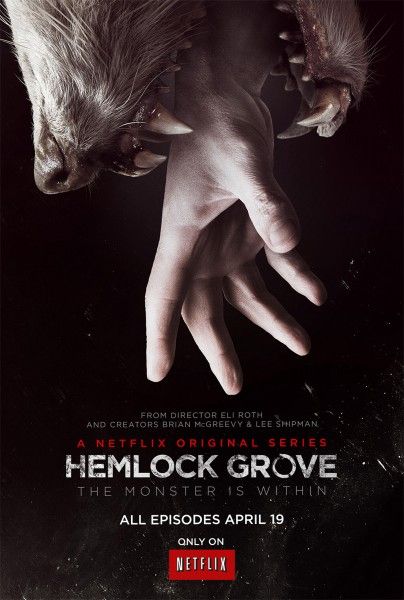From executive producer Eli Roth and based on Brian McGreevy’s gripping novel of the same name, Hemlock Grove, is a murder mystery set in a Pennsylvania steel town, in which Olivia Godfrey (Famke Janssen) is the otherworldly beautiful and controlling matriarch. As the crime goes unsolved and outlandish rumors mount, everyone is forced to confront unspeakable truths about themselves and Hemlock Grove, as the mystery unfolds in this 13-episode first season. The show also stars Dougray Scott, Bill Skarsgard, Landon Liboiron, Penelope Mitchell, Freya Tingley and Lili Taylor.
During this exclusive interview with Collider, co-stars Bill Skarsgard (“Roman Godfrey”), Landon Liboiron (“Peter Rumancek”), Penelope Mitchell (“Letha Godfrey”) and Freya Tingley (“Christina Wendall”) spoke about what drew them to the show, how the supernatural element comes into play with the characters, how nerve-wracking it was to pull off the fantastically gruesome werewolf transformation, working with this great cast, the advantage of being able to view all 13 episodes at once on Netflix, and just how many questions will be answered by the end of the season. Check out what they had to say after the jump, and be aware that there are some spoilers.
Collider: How did you come to this show?
BILL SKARSGARD: I was here for pilot season because there’s a lot of things happening in L.A. during that time, but I didn’t know. TV is a very sensitive thing. If you’re not happy with what you’re doing, I don’t think you should do it because you will do it for awhile. Sometimes it can kill a career, if you do something bad. So, I was here and I went in for auditions. I was reading a lot of scripts, and then this show came up. It definite stood out as something that no one was doing, at the time, or is doing now. They’re using this genre that we’ve been seeing so frequently these past years, but it’s just a completely different take on it and is something very, very weird and strange and super appealing. Before I read the script, my manager was like, “It’s a vampire/werewolf story,” and I was like, “I really don’t even want to read it. My brother is on True Blood. Am I going to play a vampire too?” That was my viewpoint, before I read it. And then, I started reading it and couldn’t stop reading it. It killed me that that was the only script I had. I just had the pilot, and I wanted to read more. It was just so challenging and weird and strange and very appealing and so mysterious. It keeps the audience wondering what’s happening and it makes the audience think about what’s going on and questioning characters and everything that happens in it. It’s an amazing show.
LANDON LIBOIRON: Yeah, I had the same sort of reaction. There’s so much of this vampire/werewolf stuff going around that when I first heard about it, I was like, “Eh.” But they were like, “Just read it.” You read it and it’s like this strange cocktail party for the uninvited. When you throw that many lost souls together, it’s gonna be interesting. It was just written in such a tasteful way and each character is so rich that each character is deserving of its own show. It was just a breath of fresh air to read a TV series using such an overused subject and making it unique and different. That was really cool.
PENELOPE MITCHELL: I was living in America for a few months. I uprooted my life from Australia and came over to America with the idea of pursuing my acting career. I wasn’t really sure where I would end up. I threw caution to the wind. But, this script was just phenomenal. It completely blew me away, and the rest is history.
What was your first impression of this script and the character, and what ultimately led you to pursue the series?
FREYA TINGLEY: I had just moved out to America and I was auditioning, but Hemlock Grove had something that the other projects didn’t. It defied conventions. It didn’t have the stereotypical characters, like the hot football jock and the hot cheerleader. It had characters that were outcasts, and who were unique and different, in their own individual ways.
LIBOIRON: It just had such a strong voice, and I thought they translated the series from the novel so well. It’s such an ensemble cast of really rich characters. I thought it was a really unique way of approaching this Gothic folklore literature.
MITCHELL: The first episode, as a pilot, was kind of elusive. There were a few holes that needed to be filled. The novel had already been released, so I had the opportunity to do a little bit more research. My last semester at university, right before I moved over to America, I majored in gothic literature, so I was familiar with the conventions and the narrative style that it just fit like a glove. I was so excited about it ‘cause I intimately understood the social dynamics and the inherent mental state that it was exploring. It was very exciting. It also happened very quickly. I auditioned on a Friday, was offered a test on Saturday, and came back in on Monday with the producers. It was very much just a serendipitous deal.
Had you been familiar with Eli Roth’s work?
MITCHELL: Totally! I was, and that was something that really excited me. I have two other brothers, and they’re massively influential in my viewing and my taste in films. I’m a self-confessed genre nerd. I’m a very serious actor, but a genre nerd, all the same. Going in to do my audition with Eli and Brian, and Lee [Shipman] and Mark [Verheiden], was possibly one of the most surreal experiences of my life. I never before had felt like I’d just instantly stepped into a band of brothers. We were just jiving and laughing and nerding out and sharing quotes from various films that we loved. I was raised on a staple diet of Sam Raimi and Quentin Tarantino, and a lot of Stanley Kubrick, as well. It just fit like a glove.
Did you see the book as a companion piece to the script, or did you just work with the scripts once the series got going?
MITCHELL: Once we were in the thick of things, we were predominantly focusing on the scripts. But before the show started, I had two months where I wasn’t doing anything, so I was left alone with the novel. I had a lot of time to really contemplate my character and build a really strong backstory for her, which was separate to the scripts. We didn’t actually get the scripts until a week before we started shooting. But then, once we were in it, we’d go film one episode, and then four days later, we’d start the next episode. I spent most of my time becoming a lot more intimate with those scripts. It was like a very fast-paced movie. Luckily, we had the writers as producers, and they were constantly on set. It was a collaborative process, in that sense. They were always there to discuss it with us and build that world.
How does your character fit into this world?
LIBOIRON: Peter Rumancek is the new kid in town. He’s a gypsy nomad, so he lives from place to place, not being in one place for too long. It just so happens that, within the first little while that he moves into town, one of the local girls gets murdered. And because it’s such a small town and he’s such an other-side-of-the-tracks character, he’s such an easy person to blame for it. So, he has this prejudice from the town. He meets Roman Godfrey, who’s a resident of the local town, and they have this immediate mutual connection because they’re so outside of the society that exists. They team up with their own motives to try to solve what’s murdering the local town girls.
SKARSGARD: It’s the two of them, trying to solve these murders. Roman is also a loner. On paper, he has everything. He’s good looking, he has a lot of money, he’s popular in high school, and he has a lot of power in the town because his family is the most powerful family in town. Because of that, he’s almost a prince, but he’s also a loose canon because he doesn’t want to be a part of it. He’s very self-destructive. He does a lot of drugs. And then, he meets the new kid that just moved to town and he feels that this is something different, something interesting and something new. With his arrival, these young girls start to get brutally murdered, and finally Roman has something to do. He has a purpose. For him, that’s the most important thing. Both of them have this feeling that something really important is about to happen, and the characters say that a lot. There’s this feeling that they can’t really explain, that something important is about to happen. The audience doesn’t know what that is, but they’ll find out. And it’s quite important.
MITCHELL: Letha Godfrey is a 17-year-old girl. You could compare the Godfrey family to the Carnegie family. They are very influential. As a consequence to that, Letha grows up with a lot of social consciousness and a lot of responsibility to live up to expectations, but she’s also 17 and going through a variety of existential angst and personal development. She’s going through her own personal stuff whilst the various things arise in the narrative. It’s really complicated and intense.
Landon and Freya, how would you describe the relationship between Peter and Christina?
TINGLEY: Over the summer, Christina and Peter developed this really strong bond and friendship because Christina saw something in him that she’d like to have in herself. He’s that free-spirited person. After Christina thinks that Peter is the werewolf killer, their friendship isn’t what it used to be because who wants to be friends with a killer? It’s devastating to her to lose somebody that she’s never had a similar bond with.
LIBOIRON: Their relationship formed over the summer, and all of these things are happening at the beginning of the school year. Their relationship immediately split, as soon as high school started, and I think that’s an interesting representation of how these things work. Peter is a little bit older than Christina. He has so much compassion for her and interest in her, but because of the laws of the microcosm of the world in high school, their relationship isn’t really meant to be in that world, so there’s already that space between them. And then, of course, there’s that mistrust that Peter might have eaten someone. That ruins a friendship.
Penelope, what can you say about the relationship between Letha and Peter?
MITCHELL: It’s very similar to the book. I think that’s a really interesting element in the show. Fundamentally, there are a lot of dark presences and really intense things going on. But, Letha and Peter’s relationship provides this last bastion of innocence and purity. It’s very delicate and sweet.
Is it a relationship you have to hide from your families?
MITCHELL: To begin with, but similar to how that is when you’re a teenager. You have to hide a lot of things from yourself. They aren’t necessarily aware of what they’re stepping into. When you’re teenager, your hormones and your emotions are so tumultuous and so unpredictable. You’re just trying to understand yourself. That’s what I loved about it. It’s like watching two puppies try to interact and negotiate space with their fears and vulnerabilities. It’s this constant to-and-fro. It’s like a tango. It’s very gorgeous.
What sort of relationship does Letha have with her father (Dougray Scott)?
MITCHELL: A very real one. I found that very touching in the script. I, myself, am very close with my dad. As things play out during the series and she begins to understand her own personal boundaries and essentially becomes a woman, there are some moments there that a lot of people can identify with, just learning to spread your wings. Dougray was such a generous actor to work with. He has a daughter himself, and we spent a lot of time chatting. It’s a really lovely relationship.
Landon, why is Peter so intrigued by Shelley?
LIBOIRON: In Raise High the Roof Beam, Carpenters by J.D. Salinger, there’s this one character who’s in this horrible circumstance and the only solace he finds in it is this deaf, mute grandpa. He can’t speak to him, so they just make faces at each other, whenever they feel uncomfortable. I feel like that’s the relationship with Shelley and Peter. Though they’re very sure of what they are, they both still recognize that they’re freaks. They have this unspoken understanding that they are the elephants in the room. And Shelley is just so full of compassion that it’s hard not to like her. It’s like falling in love with a puppy. You just want to flick its ears. I think that’s what Peter finds in Shelley. She amuses him and she understands him. Peter is the most happy when Shelley is around because she’s a comfort.
How does the supernatural element come into play with the characters?
MITCHELL: Letha is oblivious to most of the things that are going on, which makes her trajectory very interesting. Fundamentally, she’s very preoccupied with the stuff that’s going on, in her own life. She’s one of those beautiful characters, and what I love so much about her is that she’s very non-judgmental. She takes things at face-value. She has a very strong utilitarian instinct. She’s very self-righteous and morally conscious. I really loved inhabiting that space where you really just take things for what they are. At the same time, it’s really heartbreaking when she does come to discover what’s going on. It’s a tragic dichotomy.
LIBOIRON: It enhances their moral dilemmas.
SKARSGARD: We’re not using the supernatural element to tell a story about supernatural things, per se. That’s not what it’s about. It’s about putting characters in supernatural situations. It’s more relatable. It’s not something that the characters take for granted, either. It’s mysterious and spiritual. For Peter, it’s almost like a religion.
LIBOIRON: What Brian [McGreevy] did that was really cool was that he took this werewolf folklore and applied it to a gypsy culture. It’s more of a lifestyle. It’s who these people are. They define the supernatural. The supernatural doesn’t define them.
SKARSGARD: It makes for good drama.
LIBOIRON: It’s high stakes.
Landon, were you nervous about pulling off the werewolf transformation and making it memorable?
LIBOIRON: Yeah, it was an extremely nerve-wracking thing to approach. I refused to watch any other werewolf transformation scenes for any inspiration. I decided to go in with my own idea of what I wanted it to feel like and to look like. Of course, Brian had written such a vivid description in his novel, and it translated so well to the screen. The production team, and Deran [Sarafian] and Eli worked really well to bring it to life. I was in good hands. But, the vampire/werewolf thing is a scary thing to consider nowadays because there are such skewed preconceived notions of what it’s supposed to be. What’s special about Hemlock Grove is that it takes all those preconceived notions and slashes them apart, and creates its own world and its own unique quirks.
What was it like to see the final product?
LIBOIRON: It was very exciting to finally see something in its entirely and to see it come to life. It’s something so baffling that you can’t really comprehend yourself, even having done it. It just became its own thing. I didn’t even really feel like I was a part of it. I felt like it was its own thing. It was a very scary thing to try to accomplish, and I hope that people enjoy it.
Was it important that the supernatural element be more grounded and real, as opposed to being the sole focus?
LIBOIRON: Yeah. The show isn’t about the supernatural. It’s simply a symptom of the characters. We’ve been calling the transformation of Peter “the man period.” It’s just something that’s a part of his nature. It doesn’t need to be explained, and it’s nothing more than that. We did all really want to try to approach it as naturally, as honestly and as truthfully as possible, and it was fun to fight for that.
How has it been to work with this great cast, that’s not only made up of an ensemble of young actors, but also such incredible veteran talent?
MITCHELL: Amazing! They really are great, and everyone has the most unique energy. It’s been really fortuitous, as well. I’m from Melbourne, Australia and I was away from my family for six months. Also, the nature of our work schedule meant that it was isolating because we were working these long days. I was so fortunate to have Bill [Skarsgard], who comes from Sweden and Dougray Scott, who is from Scotland, and Landon [Liboiron] lives in Vancouver. We did forge this pseudo family vibe. We were constantly talking about work, and even when we weren’t working, just being around each other and developing our energies, I think it was something that really came through on the show. Everyone was so excited to collaborate. It was like nothing I had ever experienced. This is my first job, per se, and I couldn’t have prayed for a more generous and loving little community. From day one, we met each other and we recognized, very quickly, that we had no choice but to become family. Fortunately, we all got on really well. We just jumped in, head first. But, it felt like it was a really strong fraternity or sorority, from day one.
TINGLEY: Everybody was in a similar headspace. We’re all so passionate about what we do, and we don’t want to go along with the conventions that are put upon us. We’re all just trying to create unique things that push boundaries. One of the great things about working for Netflix is that they haven’t placed any restrictions on content or artistically.
LIBOIRON: While us youngins were all fumbling around, bumping into each other, we had this talented veteran cast to guide us through. Working with Lili [Taylor] was fantastic. All these guys have all this experience and are there to tell the story. It was very humbling to be a part of that.
Do you see the advantages in Netflix allowing the viewer to watch all of the episodes at once?
MITCHELL: In a classical sense, these kinds of stories were often published in fragmentary chapters in the back of a newspaper. A lot of Charles Dickens’ early works were published like that. At that period in time, that was a really beneficial way to grow that story because people were waiting around all week. But unfortunately, with the nature of society these days and the fact that our generation is founded on instant gratification, the marketplace needs to match that. Personally, I know the lifestyle I lead is really busy. If I want to watch an entire series of something, it usually has to be in one weekend. I’ll dedicate two days to it because it’s not the kind of thing I can come back to, every night. I think this is a really smart format.
LIBOIRON: Yeah, that’s what’s amazing about Netflix. This year has been a big year for me, in getting my TV watching done. I’ve watched Breaking Bad, Mad Men, The Walking Dead, Wilfred, Louie, and all these really amazing TV shows that are just available at your fingertips. You can watch at your own pace and be as caught up as you want. You’re not sitting and worrying about missing anything. You just watch it at your own pace. People are so busy nowadays. People are running around so much that, if they have to slot a time of the week to watch a show, they’re probably just gonna wait until the box set comes out. It’s easier to just have it there.
SKARSGARD: It’s just really irritating watching a show once a week. There are all these plot twists and you’re like, “Oh, come on! There’s no more?!” You can get tired of them tricking you into coming back for the next episode. I think it hurts the storytelling, a little bit. We can do whatever we want. The way Hemlock Grove is written, you want to watch the next episode because you want to know more. I think that’s important, so you want to watch the whole season.
LIBOIRON: You become so much more attached to the characters and not the story. You get attached to the characters more, if they’re available to you. I become so sad now, when a series ends, because they’ve become such a big part of my life. I’m like, “Okay, I’m going to go hang out with Breaking Bad today.” You get so much more attached to the people, if you’re able to watch them in large chunks like that.
Did you approach doing this like a movie, knowing that people would be able to watch all 13 of these episodes at once?
TINGLEY: As actors, you always approach it as you would any project. But, with Netflix releasing all 13 episodes at once, it’s more like a 13-hour movie then episodes.
LIBOIRON: It was like we were shooting a film and treating the story like a film. We were able to hold onto it and keep it to ourselves, until the very end. It was also the quick pace of a TV series and the fumbling around of a TV series, finding out what it was we were actually doing. With a series, you’re finding it from the moment the gates open, but with this, we had a better idea, going in. It was a mixture of the two.
Are the storylines and mysteries resolved, by the end of the season, and are new storylines and mysteries started to set up Season 2?
LIBOIRON: Yeah, like any end of a series, some questions are left unanswered and some are resolved, and new possibilities form. Especially with a show that’s a murder mystery, you’re trying to find the answers, all the way through. I think our finale is a pretty big pay-off.
Hemlock Grove is now available on Netflix.


